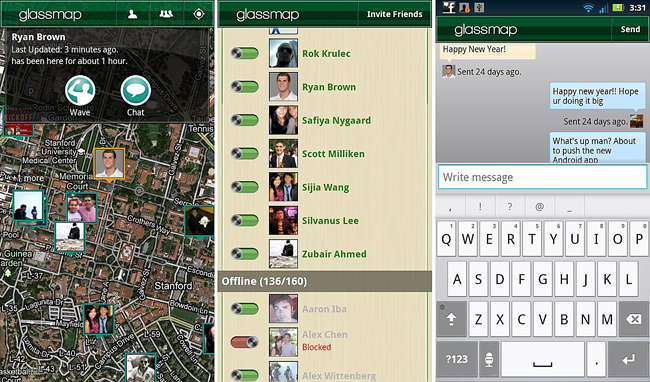As sociology junior Taylor Orth waited for friends to pick her up, she watched their faces move closer and closer to her location on the map. Even though they were running late, she knew they were nearby after checking their location on Glassmap.
Glassmap is an application for iPhones and Android phones that enables users to find their friends’s locations, and is also a means to give each user more relevant social information, including parties in the area and the ability to create events. The application was launched mid-February by three Stanford engineering students, who have since dropped out to continue working on Glassmap.
The creators designed the application with a 3D, futuristic holographic map in mind and will be releasing a Texas-optimized version in the coming months. Thuydung Vo, public relations junior and campus representative for Glassmap, is one of 10 representatives across the country. The number of representatives has grown as more and more students are made aware of the application.
Vo said the creators’ approach to Glassmap makes it easier to meet up with friends, and she is appreciative that she can now be made aware of friends’ locations via the application instead of social media.
“Technology is starting to change our communication for the better,” Vo said. “I’m sometimes so ashamed of what I know about my friends on Facebook, so I hope people see the value of this as not just some new technology, but as a new way of meeting up with friends and family.”
To login to the application and begin using its features, users must create an account via Facebook or email. Once the account is set up, users search for friends already using Glassmap on Facebook or can invite friends to join.
“I love seeing how much technology has grown over the years,” Orth said. “You know, at first the Internet seemed scary and then Facebook was revealing too much. But now that Facebook and Twitter have added the location feature, it seems that this is the direction social media is going.”
Users have said they like Glassmap because of the simplicity behind it, since Glassmap is a Google map and a list of online and offline friends.
According to Yo, the application can be useful for finding friends on Sixth Street and also an aid to find out where friends are to maintain more face-to-face contact.
“We’ve all had those times when we are trying to meet up with friends, or even forgetting to send a text notifying people of where we are,” Vo said. “I want people to be able to see me. I like getting to see friends I maybe wouldn’t normally see on a regular basis.”
Unlike similar friend-finding applications such as Highlight and Find My Friends, the team behind Glassmap has developed a passive relay technology that they say more efficently maintains battery life because the server updates locations automatically. Users such as Orth have said they notice the application seems speedy and they like not having to update their location every time they move.
In addition to its real-time location technology, Glassmap provides a layer of messaging, including the ability to “wave” at nearby friends (similar to the “poke” on Facebook) and send friends messages to coordinate meet ups. Glassmap users say this reduces the need to make additional calls or jump in and out of text or other messaging applications.
It also provides more privacy settings than some of its competitors, allowing users to choose which of their Facebook friends they wish to share their location with, and which friends they’d like to track. Additionally, users can block people without notifications.
Since Facebook friends aren’t automatically updated on their friends’ real-time locations, Orth insists Glassmap maintains more privacy. However, the balance between the revelation of too much information and also the desire to keep up with the increasing social nature of new applications has led to some conflict between whether or not these applications have the proper amount of privacy.
The creators have said an application with the right amount of privacy and simplicity doesn’t border on creepy. However, some reviewers of Glassmap, such as Liz Gannes from the tech website All Things D, believe that “the claws are already out” because applications similar to Glassmap are currently available to the public and have the potential to endanger users’ privacy.
However, users insist as long as care is taken to ensure only the people that should see your location are allowed to do so, information remains private.
“[Glassmap] has the potential to be creepy, but random people can’t start following you because it’s within your Facebook friends, and you can always turn it off,” Orth said. “I have faith that the application is secure.”
However, even some of Glassmap’s most dedicated users at UT were once skeptical about sharing private information, such as their location, publicly. In fact, many users had not ventured into the location sharing applications before being introduced to Glassmap.
“I could see for those people that have thousands of friends on Facebook that security could be a problem,” said Austin Franks, petroleum engineering junior and recent Glassmap user. “I guess there’s danger if you don’t keep track of who has it, but for now it’s so small. Once it goes viral I may worry.”
Printed on Monday, April 23, 2012 as: Application allows people to track others















